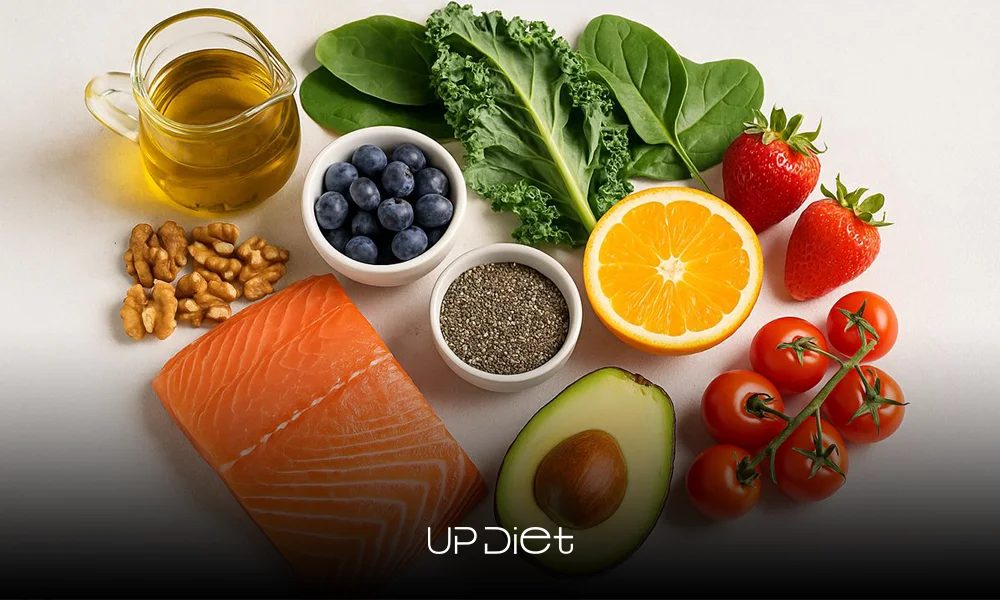Get a plan made for your unique body and goals
The Best Diet for Rheumatoid Arthritis: Foods to Eat and Avoid

Up to 75% of RA patients believe diet plays a key part in their symptoms. Studies also prove the connection between rheumatoid arthritis and diet. For example, in one survey, 24% reported that their diet affects their symptoms, with 15% experiencing improvement and 19% experiencing worsening.
In this blog, we’ll have a quick look at the ‘why’ and ‘how’, followed by covering the top foods (to enjoy and avoid) and tips to manage your RA in the long run.
Understanding Rheumatoid Arthritis and Diet
Unfortunately, there is no rheumatoid arthritis treatment diet in a literal sense. However, studies have shown that certain foods can help reduce symptoms.

In RA, the immune system mistakenly attacks joint tissues and causes swelling, stiffness, and pain. However, nutrients and bioactive compounds in some foods interrupt this process. How? Read the next part.
How Diet Impacts Rheumatoid Arthritis Symptoms
The term “anti-inflammatory foods” is too broad and doesn’t tell the whole story. The foods that mitigate inflammation and joint pain do it in different ways, including:
- Lowering inflammatory messengers (cytokines like C-reactive protein and prostaglandins) that cause swelling and pain in joints.
- Supporting immune balance and calming an overactive defense system so it attacks less aggressively.
- Reducing oxidative stress, which otherwise worsens tissue damage and fuels ongoing inflammation.
- Protecting cartilage and bone to slow the joint damage that’s often seen in this condition.
- Improving blood vessel and metabolic health, which indirectly supports joint function and reduces stiffness.
- Reducing joint swelling, improving flexibility, and slowing down the cycle of inflammation that drives RA symptoms.
Best Foods for a Rheumatoid Arthritis Treatment Diet

The best diet for rheumatoid arthritis supplies the body with antioxidants, polyphenols, healthy fats, and compounds that suppress inflammatory pathways. For instance:
- Fatty fish and plant sources of omega-3s (salmon, sardines, walnuts, flaxseeds)
- Fruits and vegetables (especially colorful, berry-rich, leafy greens)
- Legumes and nuts (beans, lentils, almonds)
- Whole grains (oats, brown rice, quinoa)
- Spices, like turmeric. Their curcumin content inhibits inflammatory enzymes and alleviates joint pain, as demonstrated in clinical trials.
Foods to Avoid with Rheumatoid Arthritis
The best RA diets limit meals that contain pro-inflammatory substances, such as refined sugars, preservatives, trans fats, and unhealthy oils. They can interact with medications, worsen the symptoms, and even promote joint damage. Here are some of the foods that are best to avoid:
- Processed meats (sausages, bacon, hot dogs)
- Refined sugar and sugary snacks (sodas, candies, pastries)
- Refined carbohydrates (white bread, pasta, baked goods)
- Too much red meat (beef, lamb)
- Fried foods and trans fats (fries, store-bought snacks)
- Processed foods (anything high in salt, sugar, and unhealthy fats)
- Alcohol
- Full-fat dairy for some patients
Best RA Diet Plan: Tips for Success

Following a rheumatoid arthritis treatment diet is beneficial, but achieving real success requires daily choices and consistency. For a sustainable RA-friendly eating plan, consider the following tips:
- Make lean or plant-based proteins, healthy fats, and non-starchy vegetables the base of your meals, and add a small portion of wholegrains.
- Consider meal prepping, so you can stick to your diet and avoid last-minute, less healthy choices.
- Drinking plenty of water helps manage symptoms. Herbal teas, such as ginger and green tea, also possess anti-inflammatory properties.
- Some people with RA react to certain foods like dairy or gluten. Please keep track of any foods that worsen symptoms and remove them from your diet.
- Speak with your healthcare provider about taking supplements to ensure you’re receiving the necessary vitamins and minerals.
- Finally, the best diet for rheumatoid arthritis is never restrictive. Always aim for a balanced, varied diet that you can enjoy over time.
Final Thoughts: Managing RA with the Right Nutrition
Your diet is a crucial component of your RA care plan. While medications address the symptoms, proper nutrition can help calm inflammation and ease stiffness. Over time, these small changes support your treatment and help you feel more in control of your symptoms.
- In this post:
- Understanding Rheumatoid Arthritis and Diet
- How Diet Impacts Rheumatoid Arthritis Symptoms
- Best Foods for a Rheumatoid Arthritis Treatment Diet
- Foods to Avoid with Rheumatoid Arthritis
- Best RA Diet Plan: Tips for Success
- Final Thoughts: Managing RA with the Right Nutrition



